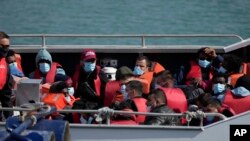Britain has called for reform of the European Court of Human Rights, as the government attempts to push through new legislation that would allow asylum seekers arriving on small boats to be immediately sent to Rwanda for processing and resettlement, with no right to appeal.
Last June, judges at the court imposed a last-minute injunction preventing the first flight from taking off. The European Court of Human Rights is the judicial body of the Council of Europe, a human rights organization with 46 member states, and it is not part of the European Union.
There has been a sharp rise in the number of migrants arriving in small boats on Britain's shores from France in recent years. The government hopes the prospect of being sent to Rwanda, with no right to return to Britain, will dissuade many migrants from making the dangerous journey across the English Channel. It also asserts the policy will lead to the dissolution of human-smuggling gangs.
'Stop the boats'
British authorities have detected almost 7,000 migrants crossing the English Channel in small boats so far this year. The total for 2022 exceeded 45,000.
British Prime Minister Rishi Sunak has repeatedly pledged to, in his words, "stop the boats." Last year, Sunak's predecessor Boris Johnson signed a deal with Kigali that would see an unspecified number of migrants flown there for processing, asylum and resettlement with no right to appeal. Britain has already paid Rwanda $150 million under the agreement.
Prime Minister Sunak pledged this week to push ahead with the plan.
"It is, of course, a shared challenge. Many countries in Europe are experiencing what we are experiencing at home, and I want to work together with others to help solve it and to stop the boats," Sunak told reporters at a meeting of the Council of Europe in Iceland Tuesday.
"Part of my approach is to put new laws in place in the U.K., that's our 'stop the boats' bill. It's novel, it's ambitious, but I believe it is compliant with our international obligations," Sunak added.
Injunction issued
Judges at the European Court of Human Rights disagree. Just as the first plane was about to take off for Rwanda on June 14 last year with dozens of migrants on board, the court issued what's known as a "Rule 39" injunction — blocking the flights on the grounds that they likely breach the Council of Europe's Convention on Human Rights, to which Britain is a signatory.
In response, the British government has introduced new legislation that would override European court decisions. The law is currently being debated in Parliament.
At the Council of Europe meeting this week in Iceland, Sunak said he would try to persuade European partners to reform the court itself.
"We want to make sure that the European Court is always conducting itself in a way which is fair, which is effective, which is transparent," he said.
European relations
But Europe is not in the mood to meet Britain's demands after its exit from the European Union, says Camino Mortera-Martinez, a Brussels-based analyst with the Center for European Reform.
"I'm not necessarily sure that they will go the extra mile to go and enter into reform of yet another European institution to please Mr. Sunak and his hardline government, when it comes to migration," she told VOA.
Some members of Sunak's Conservative party want Britain to quit altogether the Council of Europe and its convention on human rights. The last country to leave the organization was Russia, which was expelled last year after its invasion of Ukraine.
"Faced with the threats of 'right, give us what we want, or we just leave the European Convention of Human Rights and the Council of Europe,' the answer could very well be, 'well, go ahead and be a pariah state, just like Russia is,'" Mortera-Martinez told VOA. "I think it would be a mistake for Britain to do that at the moment, especially, as I say, given that we have a war next door [in Ukraine]."
'Nervous breakdown'
About a quarter of the migrants arriving on small boats in 2022 were Albanian. Britain has deported more than 1,000 back to their home country. The Albanian prime minister last month criticized Britain for singling out his country's citizens.
"[Britain is] going through a nervous breakdown as a country, so we have to understand them," Prime Minister Edi Rama said at a policy forum in Greece on April 30. "We have to understand them. They have lost a lot of points of reference, and they are really in a bad, bad place."
Britain did not respond to the comments.






